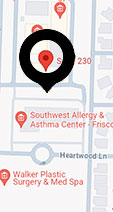Allen Reproductive Center
Allen Reproductive Center (ARC) Laboratory is a state-of-the-art facility providing patients and medical professionals with a wide variety of fertility treatments and outstanding pregnancy rates. We are passionate about providing access to these cutting edge technologies to patients in North Texas, and beyond, under the safety of a fully equipped and staffed surgical center.









